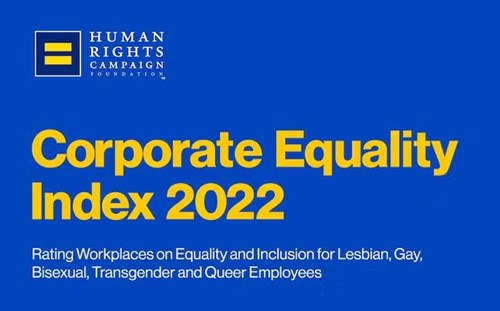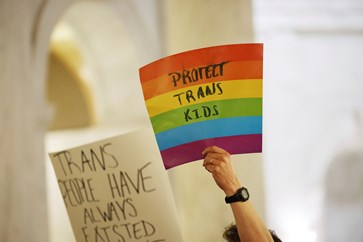"You know, we've seen it with other large corporations. We've seen Disney, we've seen these hockey teams – I mean, you go down the list, there's this enormous push. You see 'Pride Airlines' as all of the major air carriers in the United States are pushing into LGBT visibility as part of their marketing," Lindsay told American Family Radio this week.
 "You have to wonder what's going on; and as it turns out, there is more to the story than merely trying to appeal to a demographic of millennial buyers that they may think is some kind of an untapped market. It's not just business as usual."
"You have to wonder what's going on; and as it turns out, there is more to the story than merely trying to appeal to a demographic of millennial buyers that they may think is some kind of an untapped market. It's not just business as usual."
But it's very much business for better or worse. For example, Anheuser-Busch has faced backlash over its Bud Light partnership with social media influencer Dylan Mulvaney, a biological male.
Fox News, after analyzing a report from trade publication Beer Business Daily, noted the uproar as many Bud Light drinkers accused their preferred brand of pushing gender propaganda. Some celebrities have lashed out, and there have been calls for a boycott.
The strategy for Bud Light, however, may be to sacrifice the present in its efforts to build a new base for the future. Bud Light Vice President Alissa Heinerscheid had previously said as much as a guest on the "Make Yourself At Home" podcast.
"I'm a businesswoman, I had a really clear job to do when I took over Bud Light, and it was 'This brand is in decline, it's been in a decline for a really long time, and if we do not attract young drinkers to come and drink this brand there will be no future for Bud Light,'" Heinerscheid said.
Businesses bend to demands of culture climate
Most businesses are not giving up on the present. In their efforts to carve out market space, they're putting a lot of stock into the Human Rights Campaign, a political advocacy organization founded in 1980 by the late Steve Endean. Endean became the nation's first gay rights lobbyist in 1978, and HRC works to advance the interests of the LGBTQ+ community.
 |
The HRC tracks and ranks businesses through its Corporate Equality Index (CEI) on their efforts at LBGTQ+ equality and inclusion.
"Actually, they put out a bunch of different scores. There's one for public utilities called the Municipal Equality Index as well, and the scoring system is out of a hundred points, and it determines how well you're adhering to what the HRC believes is correct," Lindsay told show host Jenna Ellis.
A poor HRC score could damage a company's ability to attract business and lower its ESG score on environmental, social and governance topics.
"And if you don't have a good score with that, you lose your seat at a lot of tables. Corporate recruiting becomes very difficult. Your ESG score can get dropped. There are many punishments for corporations that don't play along with earning this score from the HRC," Lindsay explained.
The unanswered question is how the Human Rights Campaign's CEI has gained such power, but it has – and it's spanned several White House administrations.
"Because what goes into the Corporate Equality Index is do you have the right kinds of internal workplace policy? Do you go out of your way to make sure that you hire enough LGBTQ people? Do you have those governance scores? Do you take part in activities to increase LGBTQ visibility? That's a score, a social score. Do you put in policies to make LGBTQ inclusivity a priority at your workplace?" Lindsay said.
|
|
Companies pursue perfection
Lindsay says he's identified a trend since 2002 in which corporations have been "extremely enthusiastic" about trying to achieve a perfect CEI score.
"You have corporations across the board – American Airlines, for example, Anheuser-Busch, etcetera – bragging about how many years, maybe even almost back to the beginning, that they've maintained a perfect CEI. So, there's something causing corporations to not just desire to have this score as a feather in their cap but to really take pains to earn a top score," he said.
A company's CEI score has cumulative effects. So why Heinerscheid may be sincere in externally seeking a new generation of Bud Light consumers, years of strong CEI scores can change companies from within.
"If you earned a 100, say five years ago, you've had five years of new requirements added to you to keep your score every single year, which operates like an extortion racket," Lindsay said.
And according to the author, it's not enough to satisfy a list of goals for a perfect CEI score. The score is a moving target as points can be deducted depending on how a company spends its money. Supporting a cause that HRC doesn't agree with could result in a lower CEI score even if hiring and workplace practices have been favorable.
In fact, Anheuser-Busch felt the wrath of the HRC two years ago after giving to some politicians who supported legislation that LGBTQ+ advocates opposed.
"The HRC put them on notice and said that they had to correct this or else they would incur the wrath of, of those negative points. And so they had to play catch-up," Lindsay said.
James Lindsay (pictured above) is founder of New Discourses and author of "Cynical Theories: How Activist Scholarship Made Everything about Race, Gender, and Identity – and Why This Harms Everybody."








